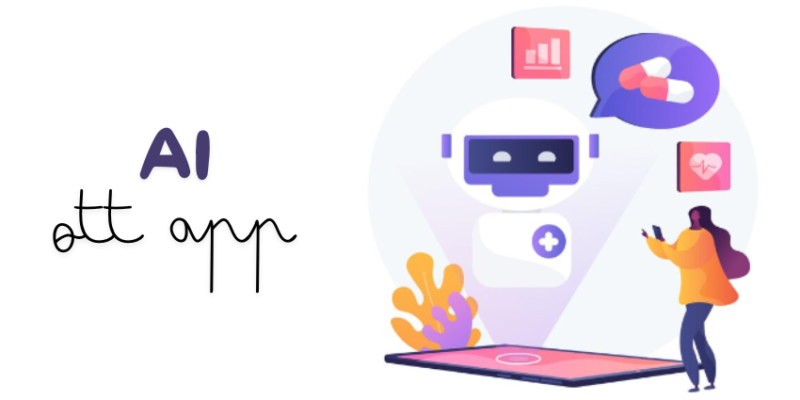
The Over-The-Top (OTT) content delivery model has revolutionized the entertainment industry, providing users with the convenience of accessing content anytime and anywhere. As the demand for OTT services continues to soar, integrating Artificial Intelligence (AI) into OTT app development has become a game-changer. In this blog, we will delve into the benefits, use cases, and future scope of AI in OTT apps, with a focus on how this integration can shape the industry by 2025.
The Role of AI in OTT App Development
Artificial Intelligence, with its capabilities to analyze data, predict user behavior, and automate processes, is transforming the OTT landscape. AI technologies are enabling OTT platforms to offer personalized experiences, improve content recommendations, enhance security, and streamline operations. For custom software development companies, leveraging AI in developing video streaming apps and white label OTT platforms is becoming increasingly essential.
Benefits of AI in OTT Apps
- Personalized Content Recommendations
One of the most significant advantages of AI in OTT apps is the ability to deliver personalized content recommendations. By analyzing user data such as viewing history, preferences, and behavior, AI algorithms can suggest content that aligns with individual tastes. This not only enhances user satisfaction but also increases engagement and retention rates. - Enhanced User Experience
AI-powered features like voice recognition, natural language processing, and chatbots can significantly enhance the user experience. For instance, voice search allows users to find content more efficiently, while chatbots can provide instant customer support, addressing queries and resolving issues in real-time. - Content Discovery and Curation
AI helps in curating content libraries by categorizing and tagging content accurately. This improves content discoverability, making it easier for users to find what they are looking for. AI-driven content curation also ensures that the most relevant and trending content is highlighted, keeping the platform fresh and engaging. - Predictive Analytics
AI enables OTT platforms to leverage predictive analytics for better decision-making. By analyzing user data and trends, AI can predict what type of content will be popular in the future. This helps in content acquisition and production planning, ensuring that the platform always has a compelling lineup of shows and movies. - Efficient Content Delivery
AI optimizes content delivery by analyzing network conditions and adjusting the video quality accordingly. This ensures a seamless viewing experience, even in areas with limited bandwidth. AI-driven adaptive bitrate streaming is crucial for maintaining high-quality video playback without buffering. - Security and Fraud Prevention
AI enhances the security of OTT platforms by detecting and preventing fraudulent activities such as account sharing, unauthorized access, and content piracy. AI algorithms can monitor user behavior and identify suspicious patterns, enabling swift action to protect the platform and its content.
Use Cases of AI in OTT Apps
- Personalized Recommendations
Netflix is a prime example of an OTT platform leveraging AI for personalized recommendations. The platform uses AI algorithms to analyze user preferences and viewing habits, providing tailored content suggestions that keep users engaged and satisfied. - Content Creation and Production
AI is also making its mark in content creation and production. For instance, AI-driven tools can analyze scripts and predict their success based on factors like genre, cast, and historical data. This helps OTT platforms invest in content that is more likely to resonate with audiences. - Voice and Visual Search
Integrating AI-powered voice and visual search capabilities can enhance content discovery. Platforms like Amazon Prime Video allow users to search for content using voice commands, making it easier to find specific shows or movies without typing. - Sentiment Analysis
AI can perform sentiment analysis on social media and review platforms to gauge audience reactions to content. This helps OTT platforms understand what resonates with their audience and make data-driven decisions on content strategy and marketing. - Ad Personalization
For ad-supported OTT platforms, AI can personalize advertisements based on user data. This ensures that users see ads that are relevant to their interests, improving ad effectiveness and user experience. - Automated Content Moderation
AI-driven content moderation tools can automatically detect and flag inappropriate or copyrighted content, ensuring that the platform adheres to legal and community guidelines. This reduces the burden on human moderators and maintains the integrity of the platform.
Scope of AI in OTT Apps by 2025
As we look towards 2025, the integration of AI in OTT apps is expected to deepen, bringing about transformative changes in the industry. Here are some potential developments:
- Hyper-Personalization
By 2025, AI in OTT apps is likely to advance to a level where hyper-personalization becomes the norm. OTT platforms will be able to create highly individualized experiences by analyzing a vast array of data points, including user behavior, preferences, and real-time context. This will lead to more precise content recommendations and tailored marketing strategies. - AI-Generated Content
AI-generated content, such as deepfake videos and AI-written scripts, could become more prevalent. While this raises ethical concerns, it also opens up new possibilities for content creation, allowing platforms to produce unique and innovative content that stands out in a crowded market. - Enhanced Predictive Analytics
The predictive capabilities of AI will continue to improve, enabling OTT platforms to make more accurate forecasts about audience preferences and content trends. This will help in optimizing content libraries, scheduling releases, and allocating marketing resources more effectively. - Advanced Security Measures
As cyber threats evolve, AI will play a crucial role in enhancing security measures for OTT platforms. AI-driven algorithms will be able to detect and respond to new types of threats in real-time, ensuring the protection of user data and content. - Seamless Multiscreen Experience
AI will facilitate a seamless multiscreen experience, allowing users to switch between devices without any disruption. This will be particularly important as the consumption of OTT content on mobile devices and smart TVs continues to grow. - Immersive Technologies
The integration of AI with immersive technologies like Virtual Reality (VR) and Augmented Reality (AR) will offer new dimensions to content consumption. By 2025, AI-powered VR and AR experiences could become more mainstream, providing users with immersive and interactive entertainment options. - Sustainability and Efficiency
AI will contribute to making OTT platforms more sustainable and efficient. By optimizing server usage, reducing energy consumption, and managing content distribution more effectively, AI can help platforms minimize their environmental impact while maximizing performance.
How Custom Software Development Companies Can Leverage AI
For custom software development companies specializing in OTT app development, incorporating AI into their solutions is becoming indispensable. Here are some strategies to consider:
- Invest in AI Expertise
Developing expertise in AI technologies is crucial for staying competitive. Investing in AI research and training will enable development teams to create innovative solutions that leverage the full potential of AI. - Collaborate with AI Specialists
Partnering with AI specialists can provide valuable insights and accelerate the integration of AI into OTT apps. Collaborations can lead to the development of advanced features such as predictive analytics, personalized recommendations, and automated content moderation. - Focus on User Experience
AI should be used to enhance the overall user experience. By prioritizing features that improve content discovery, personalization, and interactivity, development companies can create OTT apps that stand out in the market. - Stay Ahead of Trends
Keeping abreast of the latest AI trends and developments is essential for maintaining a competitive edge. Attending industry conferences, participating in AI research communities, and monitoring market trends will help companies stay ahead of the curve. - Build Scalable Solutions
AI-driven features can generate significant amounts of data and require substantial computational power. Developing scalable solutions that can handle increased data volumes and processing demands is crucial for the long-term success of AI-integrated OTT apps. - Emphasize Security
As AI becomes more integral to OTT platforms, ensuring robust security measures is vital. Development companies should focus on integrating AI-driven security features that can detect and mitigate threats in real-time.
Conclusion
The integration of Artificial Intelligence into OTT app development is set to redefine the industry, offering numerous benefits such as personalized content recommendations, enhanced user experiences, and improved security. By 2025, AI is expected to play an even more significant role, driving innovations and transforming how users consume content. For custom software development companies, embracing AI technologies and focusing on delivering AI-driven solutions will be key to staying competitive and meeting the evolving demands of the OTT market.
In a rapidly changing digital landscape, the ability to leverage AI effectively will determine the success of OTT platforms. By understanding the benefits, exploring the use cases, and anticipating future trends, stakeholders in the OTT industry can position themselves for growth and innovation in the years to come. As AI continues to evolve, its impact on OTT app development will undoubtedly lead to more dynamic, engaging, and secure entertainment experiences for users worldwide.
To read more about How Water Distillation Units Can Improve Your Drinking Water Quality






